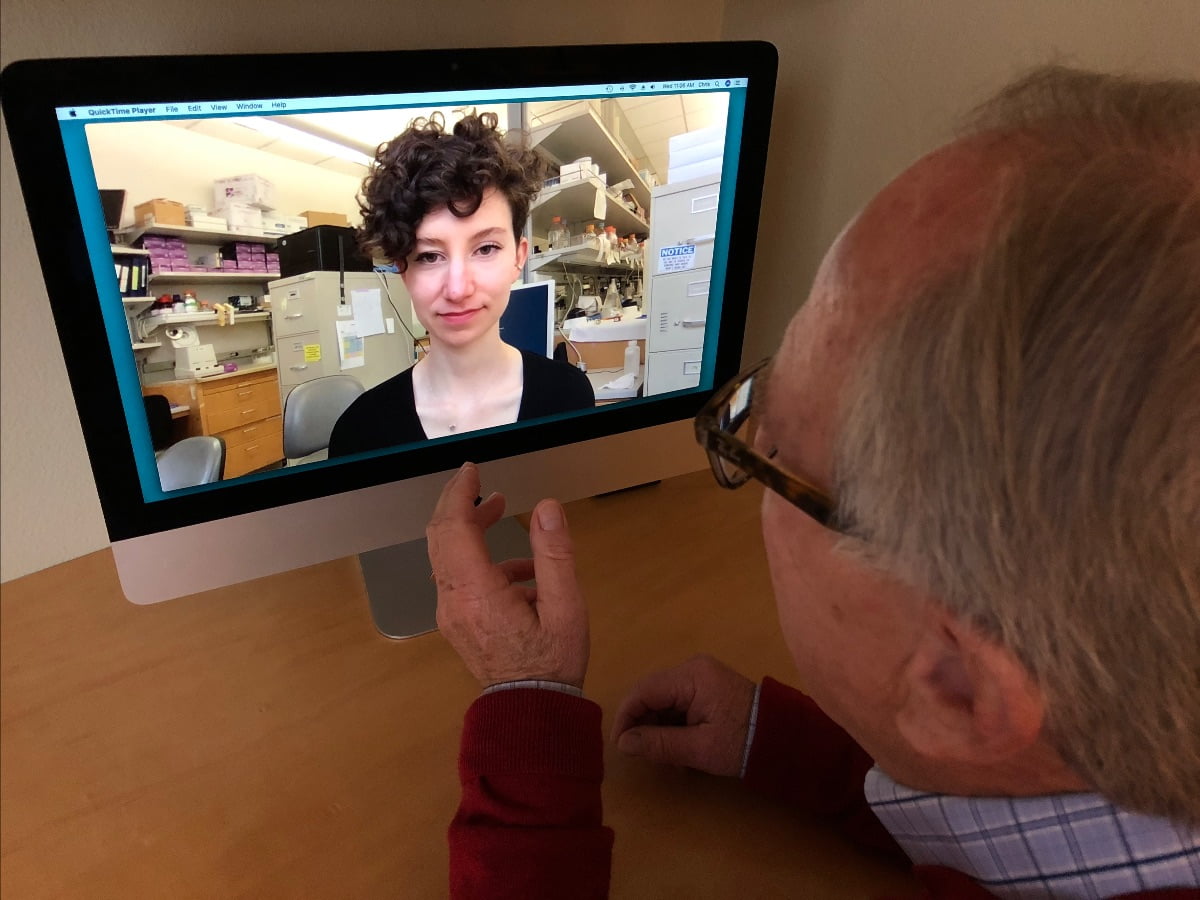
Winter 2020 Newsletter
Fellow Leverages A.P. Giannini Fellowship to Jump Start New Research Program
Q&A with Sergey Stavisky, Ph.D.
2018 A.P. Giannini Fellow
Briefly describe the focus of your research.
I study how our brains generate movements, with a specific medical application in mind: building devices that bypass damaged parts of the nervous system to provide people who are paralyzed with a way to move and communicate. Right now, I’m trying to understand the neural signals that accompany arm movements and speaking. My goal is to enable participants in our brain-computer interface clinical trial to move a robotic arm simply by trying to reach out with their hand and to synthesize speech simply by trying to say something.
Tell us about the lab where you do your research.
I’m part of Stanford’s Neural Prosthetics Translational Laboratory, a small group of 10 people working on projects that seek to understand movement-controlling areas of the human brain and to develop brain-computer interfaces to restore lost abilities. We work closely with Krishna Shenoy’s research group, which investigates fundamental questions in neuroscience and develops pre-clinical brain-computer interfaces. Finally, we are part of BrainGate, a consortium of 30 researchers across multiple institutions. BrainGate conducts the clinical trial that my studies fall under. I really enjoy being in a small group that is closely affiliated with several larger groups; I have a wealth of expertise available to accelerate my own projects.
You are a recent recipient of the Burroughs Wellcome Fund Career Award. What is the fund and how will the award advance your research?
The Burroughs Wellcome Fund supports biomedical sciences, similar to the A. P. Giannini Foundation. The Career Award at the Scientific Interface supports young scientists at the transition from their postdoctoral training to becoming independent faculty leading their own research group.
Winning this award means that I have the financial resources to launch my own university lab at the conclusion of the Giannini fellowship. This support is invaluable, especially since it is challenging for new faculty to win major federal grants in the early phases of their work. My goal is to use the award to jump-start my research to enable people with paralysis to use brain-computer interfaces to actualize movement.
Reflecting back on your experience as an A.P. Giannini Fellow, how did the fellowship contribute to your professional development?
In addition to financially supporting fellows, APG provides personalized “soft skills” training. The communication and public speaking coaching were particularly helpful to prepare for scientific presentations and interviews. The training helped me simplify phrases and ideas and improve my delivery to better engage with audiences and convey my enthusiasm about my research.

Sergey Stavisky, Ph.D.
The A.P. Giannini Foundation’s Communications Training Program
There is a growing awareness of the importance of making scientific research accessible to a broader community. To this end, the A.P. Giannini Foundation launched a communications training program for new fellows in 2015. The communications program is designed to help fellows explain their important work in a way that other scientists and even lay people can understand.
The program lasts approximately six months during which each new fellow meets monthly via Skype with the Foundation’s Journalist-in-Residence, Jerry Kay, for 30-minute sessions. Fellows learn the essential components of a successful presentation and are assigned specific skills to work on in between sessions. At the end of the training, each fellow presents his or her research at the Foundation’s annual colloquium. These presentations are videotaped and produced as part of the Foundation’s video series, “Crossroads: At the Intersection of Research & Medicine.”
The A.P. Giannini Foundation is the only postdoctoral research fellowship program that provides its participants with this kind of individual coaching. Former participants praise the program, and one fellow recently shared that she won an award as a result of the communications training. As 2017 Fellow Emily Mankin, Ph.D, writes, “Recently, the post-doctoral associations of all universities in Los Angeles had a city-wide post-doc symposium, and they put out a call for people willing to give an 8-minute ‘Ted-style’ talk that would be accessible to post-docs from any field of knowledge. They gave out awards to the top three speakers, and I won first place! This is a tangible point where the development opportunities offered by the Foundation made a clear difference for me.”
It is the Foundation’s hope that the communications program, coupled with research funding and leadership training, prepares A.P. Giannini Fellows to become leaders in their respective fields.

2019 Fellow Lauren Albrecht, Ph.D., meets monthly via Skype with Journalist-in-Residence Jerry Kay.
Crossroads: At the Intersection of Research and Medicine
A video series highlighting the research of A.P. Giannini Fellows
Invitation to Join Annual Colloquium
Stanford University School of Medicine
Recent Publications, Grants & Speaking Engagements
Brett Babin, Ph.D.
2018 Fellow
Babin, Kasperkiewicz, Janiszewski, Yoo, Drag, & Bogyo:
2016 Fellow
Genome Biology, November 2019
Amanda Janesick, Ph.D.
2018 Fellow
Dr. Janesick’s research on developing new treatments for deafness was featured in Audubon magazine in November 2019:
2015 Fellow
Recent recipient of a NIH K08 grant.